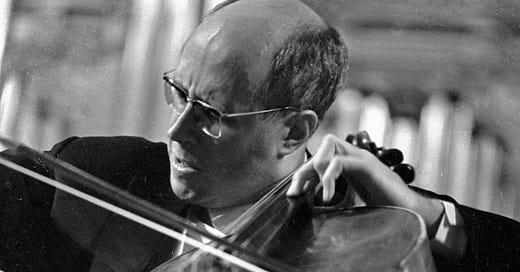We all heard during our life a professional classical musician saying that he was practicing seven or sometimes even eight hours a day.
Didn’t you ?
Well, the immense Russian cellist and composer Mstislav Leopoldovich Rostropovich wasn’t of that opinion.
In a great article that appeared on the online magazine Strings, one of his students, Elizabeth Wilson, recalls:
“I first met Rostropovich backstage at the Edinburgh Festival after his electrifying performance of Shostakovich’s First Concerto. I was just 15, an aspiring cellist, if rather backward in standard, and here was my idol, whose recordings I knew inside out, who had just played the concerto that I most adored. Meeting him was just as exciting as hearing him play—he was still exhilarated and bubbling with energy after the performance. I was immediately folded into his famous bear-hug embrace, and addressed directly, “When are you coming to play for me? Tomorrow?” I was amazed that he even noticed me, and also filled with terror. I found out the next day that his external ebullience was matched by a deep seriousness. He set me a program of three and a half hours of practice a day: two hours for scales, one hour for studies, and “half an hour for the rest.” He promised to hear me next time he came to the UK—a promise he kept every six months for the next two years”
In another article called “5 Habits Of Celebrity Cellists”, Rostropovich says:
“I generally practiced at most two hours per day. My record was over a four-day period after Shostakovich gave me the score to his first cello concerto...he said that if I liked it he would dedicate it to me. I was in heaven! I went straight home and practiced ten hours that day, ten hours the next day, eight hours the day after that, and then six hours on the fourth day. I only practiced that hard because I was so excited about the piece, and that was the most I practiced in all of my 79 years. I played it for Shostakovich from memory after the fourth day, which was one of the proudest moments in my life.”
Practicing must be an act of profound devotion to the instrument we play, and ultimately to ourselves.
That’s why it’s essential to leave out all the pre-fabricated opinions we may have heard about how many hours a day great musicians practice, and how you should do the same in order to achieve high results.
The truth is that it’s very common to see many aspiring professional musicians practice hours and hours every day, without really improving much.
If this happens, it’s a great idea to re-evaluate the whole picture, maybe by coming back to a much shorter (but regular and deeply focused) practice routine.
What do you think? Feel free to leave your comment below!
Thanks for your time and see you soon.
If you like our newsletter, please consider supporting it.
Thank you.




Very interesting read.
I think this is an important subject to point out today since some musicians, nowadays, focus on quantity rather than quality.
I believe that each and every musician has a different way of practicing and since every person is different than the other, they grow at their own pace.
I strongly agree with the idea that having shorter but regular and deeply focused practice hours can result in a good outcome in this case.
In addition, I strongly believe in the theory of practicing every day (even if just for 30 minutes) rather than pouring all your energy into one full day of practice and having to take few days later to recharge. For my part, practicing my instrument daily was the best way to achieve fast and efficient results.